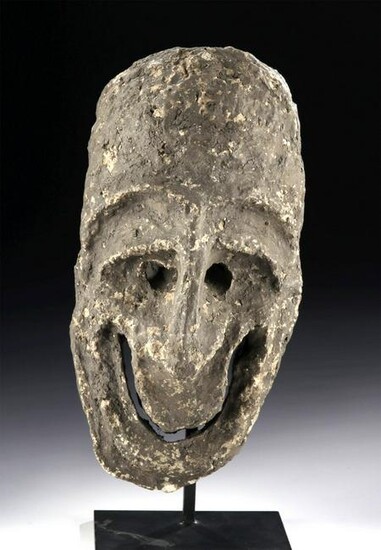Rare Vanuatu Pentecost Island Stone Grade Society Mask
Oceania, Vanuatu, Pentecost Island, collected in Bunlap in 1968, made ca. 1900 CE. A fascinating and incredibly rare stone mask, its surface coated in a thick, earthy black pigment, carved to be part of a ritual for the Grade Society. The face has a leering grin, a large, thin nose with exaggerated nostrils, and deeply incised eyebrows. The eyes are closely spaced and set back, each depicted as perfectly round perforations near the exact center of the face. The forehead is large and relatively smooth and there is almost no chin. The back of the mask is hollowed out, though it seems to be too small an area to fit a human face and was probably just held. This type of mask is very similar in style to wooden masks known as "chubwan" (see a similar example at the National Gallery of Australia: NGA 2011.1284). Size: 5.4" W x 11.25" H (13.7 cm x 28.6 cm); 12.85" H (32.6 cm) on included custom stand.
Like many places in Polynesia, Vanuatu traditionally has a grade-taking system so that individuals within the society can rise in status. This includes wearing ritual paraphernalia and providing pigs for public sacrifice. Vanuatu society is incredibly complex for its size - 250,000 inhabitants speak over 100 languages. Hence, the carver of this mask may have been part of a very small contingent. These Grade Societies - similar to guilds - are sadly now mostly lost to history, and with that so is the meaning of their masks. Still, it is easy for us today to see the power of this mask with its striking, deeply carved features. Felix Speiser, author of "Ethnology of Vanuatu" and visitor to the island in 1910 described a similar mask, "...such a face, seen in the semi-darkness of the forest by the light of flickering torches, must have had a frightful enough effect".
Provenance: private New York, New York, USA collection; ex-Dr. John Fowler collection, collected in 1968 in Bunlap, Pentecost Island, Vanuatu
All items legal to buy/sell under U.S. Statute covering cultural patrimony Code 2600, CHAPTER 14, and are guaranteed to be as described or your money back.
A Certificate of Authenticity will accompany all winning bids.
We ship worldwide to most countries and handle all shipping in-house for your convenience.
#150361
Condition Report: Some loss of pigment as shown, with small chips and nicks commensurate with age. Form is well preserved. There may be a tiny loss from the bottom of the chin or that may be the shape of the stone.
View it on
Estimate
Time, Location
Auction House
Oceania, Vanuatu, Pentecost Island, collected in Bunlap in 1968, made ca. 1900 CE. A fascinating and incredibly rare stone mask, its surface coated in a thick, earthy black pigment, carved to be part of a ritual for the Grade Society. The face has a leering grin, a large, thin nose with exaggerated nostrils, and deeply incised eyebrows. The eyes are closely spaced and set back, each depicted as perfectly round perforations near the exact center of the face. The forehead is large and relatively smooth and there is almost no chin. The back of the mask is hollowed out, though it seems to be too small an area to fit a human face and was probably just held. This type of mask is very similar in style to wooden masks known as "chubwan" (see a similar example at the National Gallery of Australia: NGA 2011.1284). Size: 5.4" W x 11.25" H (13.7 cm x 28.6 cm); 12.85" H (32.6 cm) on included custom stand.
Like many places in Polynesia, Vanuatu traditionally has a grade-taking system so that individuals within the society can rise in status. This includes wearing ritual paraphernalia and providing pigs for public sacrifice. Vanuatu society is incredibly complex for its size - 250,000 inhabitants speak over 100 languages. Hence, the carver of this mask may have been part of a very small contingent. These Grade Societies - similar to guilds - are sadly now mostly lost to history, and with that so is the meaning of their masks. Still, it is easy for us today to see the power of this mask with its striking, deeply carved features. Felix Speiser, author of "Ethnology of Vanuatu" and visitor to the island in 1910 described a similar mask, "...such a face, seen in the semi-darkness of the forest by the light of flickering torches, must have had a frightful enough effect".
Provenance: private New York, New York, USA collection; ex-Dr. John Fowler collection, collected in 1968 in Bunlap, Pentecost Island, Vanuatu
All items legal to buy/sell under U.S. Statute covering cultural patrimony Code 2600, CHAPTER 14, and are guaranteed to be as described or your money back.
A Certificate of Authenticity will accompany all winning bids.
We ship worldwide to most countries and handle all shipping in-house for your convenience.
#150361
Condition Report: Some loss of pigment as shown, with small chips and nicks commensurate with age. Form is well preserved. There may be a tiny loss from the bottom of the chin or that may be the shape of the stone.



